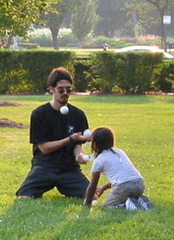I bought a bracelet today. Two young girls, no more than 6 or 7, crowded around me at the ghostly white temple at San Juan Chamula, offering various items to sell, pleading with their small, dirty hands; their faces wearing more years than their age.
Chamula is a small remote town. On market day, the plaza in front of the main church is crowded with merchants from the surrounding villages. Chamulan men wear white or black woolen vests and large cowboy hats. Inside and around the temple, the locals strictly enforce a “no photo” policy. Young children run over and block the views of foreigners trying to sneak their cameras out; foreigners eager to capture a shot of the local culture, a trophy to their cultural sophistication, all the while treating it with disrespect and disregard.
The inside of the temple is gorgeous. There are no seats, just a thin blanket of pine needles on the ground. Candles line the floors and walls, sending smoke swirling up to the ceiling, dancing in the rays of the light. Tzotzil women from nearby villages in beautiful deep blue and red garments set up make-shift alters, brushing away the pine needles and laying out candles in rows and worshipping until the candles melted into small wax rorschach blots on the ground, the flames dissolving away. Young children in black woolen dresses sit beside their parents, slowing learning the rituals passed down for generations. Sometimes gazing around the smoke filled chamber with as much confusion and bewilderment as the few gringos wandering around. Every now and then the boom of firecrackers for the ongoing Christmas celebration would reverberate throughout the church, briefly interrupting the prayers and songs of worshipers inside.
After awhile I head outside as I hear approaching music, I open the church door and see the entrance surrounded by Chamulan men in colorful garbs and a full band; locals are waving pine branches and incense began a slow journey to the heavens, until dissipating in the cool breeze sweeping over the hills. Nearby, firecrackers are set off, first one sent soaring over the church, followed by a series of large deafening blasts. I walk over to a nearby pavilion and watch the celebration for the next hour.
Two young girls approached me. You turn down dozens of kids like them a day. The deep black eyes staring at you. Their dirty fingers gripping yours. They plead and they beg. And you say, No. Shake your head. And pretend to have no money. You have money. More than they could dream of, but not enough for all of them. So you turn down most. I found myself unable to this time, unable to resist their cute pleading voices and faces, found a bracelet I liked and let them tie it around my wrist.
Reading at a Zapatista café in the afternoon, young children wander in and out, asking to shine my beaten and worn boots. They offer little animal figures, more bracelets, scarves. Children from Europe and America play around them.
I sit and read. Two kids sit on the steps outside the door. Sometimes they look over. Sometimes I avoid eye contact. I don’t want them to come over, to be forced to say no again. Almost in shame, I bury my eyes deeper into my book. Like many tourists, backpackers, and travelers, I’m tired of reality intruding on my vacation.
It reminds me of the mobs of kids in Mali, twenty or thirty kids swarming you at every village. Sometimes not asking for anything, just grabbing your hand and following you around, tiny fingers fighting for any part of you that they can grab. I think of the kids at Angkor Wat. You buy one bracelet and suddenly a dozen desperate faces peer up at you, until you can barely fight your way from the crowd to the next ancient temple demanding your attention, demanding you turn away from flesh and blood.
It’s easy to get annoyed at the constant begging. You often get frustrated and perhaps turn away more rudely, more forcefully than you should. I remember one of my first weekends in Sierra Leone. I was tired from work and heading into the market. Someone began nudging me from behind, asking for money. I shrug him off and turn around, annoyed at the intrusion of my physical space. I turned and stared at a young boy, probably no more than 12 or 13, holding up the two stumps left where his hands used to be. He must have been no more than 6 or 7 when they were hacked off. His hands final farewell, before they fell to the chopping block, probably the mocking RUF question, “short sleeve or long sleeve?”
In Mali, a friend of mine and I talked about cultural differences, where the child may simply not understand someone with wealth not sharing it. The community ethos, or communitarian spirit was so much stronger. It was natural to share whatever you had. A group of kids approached us asking for money. Their cloths ragged and torn. Bare feet against the dirty ground of Segou. The Niger River cutting its way through the sweeping desert hills. We replied by asking them for money. They took out what few coins they had, held it out in their tiny, dirt-caked palms, and offered it to us.

No comments:
Post a Comment